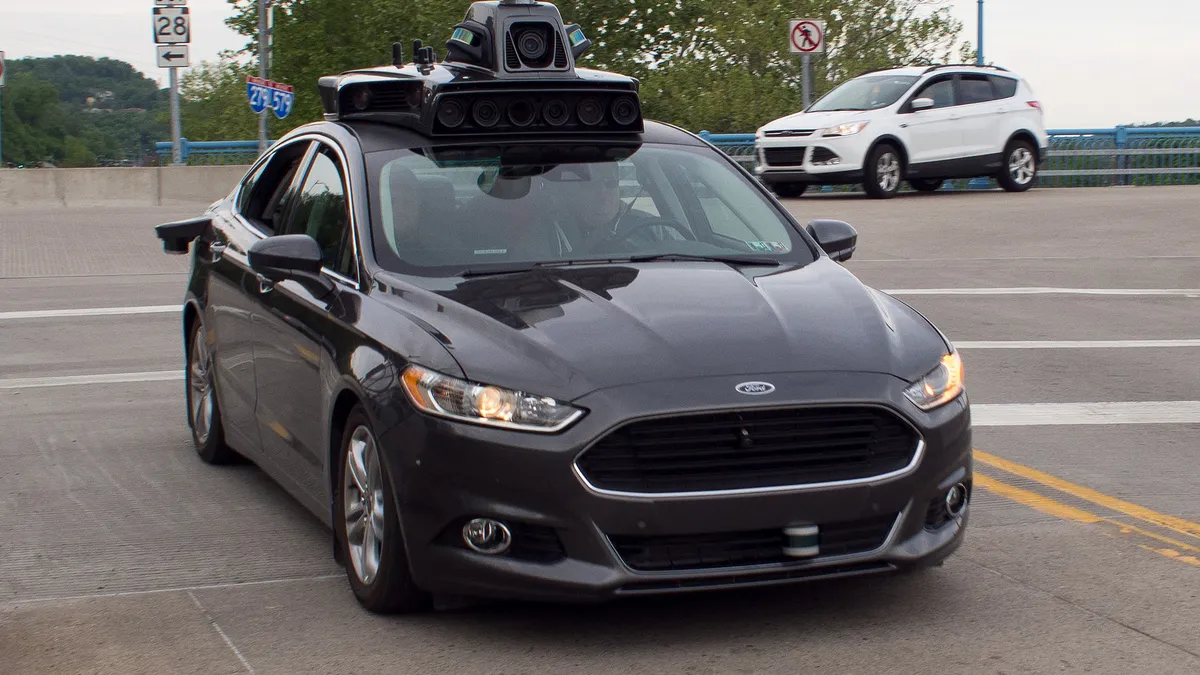UPDATED, Dec. 8, 2020: In paperwork filed with the Securities and Exchange Commission (SEC) on Monday, Uber confirmed it will sell its Advanced Technologies Group (ATG) division to Aurora Innovation.
As part of the deal, which is expected to close early next year, Uber will invest $400 million into Aurora for an approximately 26% ownership stake. When the deal closes, the companies will "collaborate with respect to the launch and commercialization of self-driving vehicles on the Company’s ridesharing network," Uber said in its 8-K form.
ATG’s 1,200-person staff will also be acquired by Aurora, Wired reports, tripling its workforce and bringing the company’s valuation to $10 billion.
Dive Brief:
- Uber is on the cusp of selling its autonomous vehicle (AV) division, the Uber Advanced Technologies Group (ATG), to Aurora Innovation for an undisclosed amount, according to reporting from TechCrunch, citing anonymous sources. Both Uber and Aurora Innovation declined to comment on the reports.
- ATG had been valued at $7.25 billion last July after a major investment from Toyota, SoftBank and others, but has struggled to stay afloat as Uber looks for a way to find profitability by shedding or spinning off some of its assets.
- Uber has been in talks with Aurora Innovation regarding the acquisition since October, TechCrunch reports, noting the ride-hailing giant "has been shopping" ATG to various companies, including automakers. Founded in 2017, Aurora Innovation has been focused on building the technology to support AVs and help them navigate without a human driver.
Dive Insight:
Uber's ATG arm has seen a difficult few years of enduring several controversies. An Uber-owned AV struck and killed a pedestrian in Tempe, AZ two years ago, an incident that led the National Transportation Safety Board (NTSB) to say the company had an "inadequate safety culture." It has also been the subject of lawsuits, with rival Waymo alleging some of its former employees stole trade secrets and infringed on patents while working for ATG.
In its S-1 paperwork, filed with the Securities and Exchange Commission (SEC) in 2019 for its initial public offering (IPO), Uber said it had spent $457 million up to that point on research and development for ATG and other programs, but in the intervening period, it has sold or spun off various projects in a bid to turn a profit. In the last 12 months, Uber sold its Jump micromobility platform, sold a $500 million stake in its Uber Freight logistics platform and bought food delivery service Postmates for $2.5 billion.
Profitability concerns have only intensified during the coronavirus (COVID-19) pandemic. In Uber's Q3 earnings call earlier this month, CEO Dara Khosrowshahi said he remains focused on "improving the overall health of a company, by taking out more than $1 billion in fixed costs, strengthening our balance sheet, and more rigorously allocating capital with a focus on our core segments."
Indeed, Chief Financial Officer Nelson Chai noted on the earnings call that ATG and other technology programs had an Earnings Before Interest, Taxes, Depreciation, and Amortization (EBITDA) loss of $104 million in the quarter, even as test vehicles returned to the streets of Washington, DC and Pittsburgh. Such a loss signifies the company continues to sink money into its ATG program but is not seeing much in the way of a return on its investment or cash flow.












